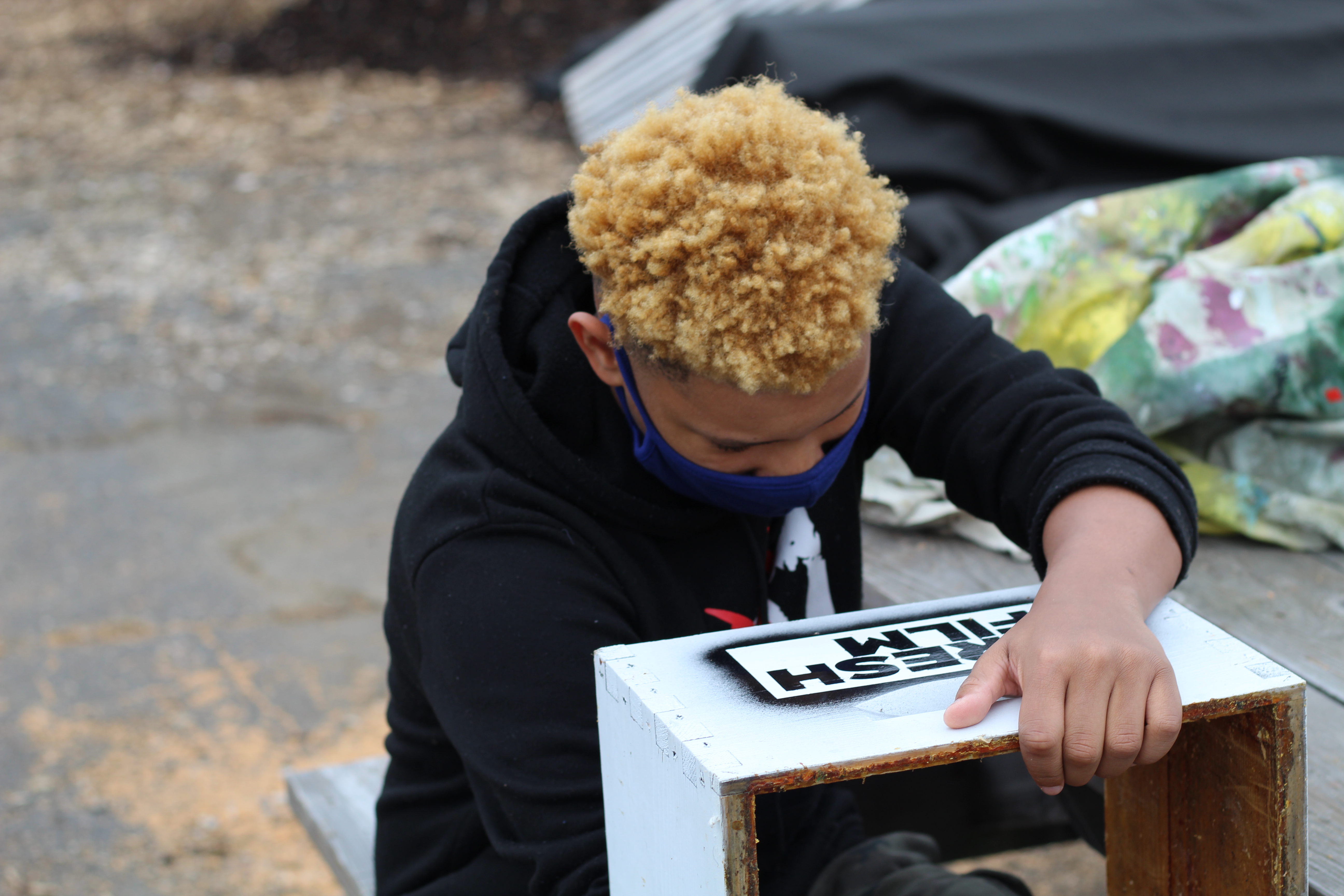
Community Gardens | Fair Haven | The Hill | The Huneebee Project
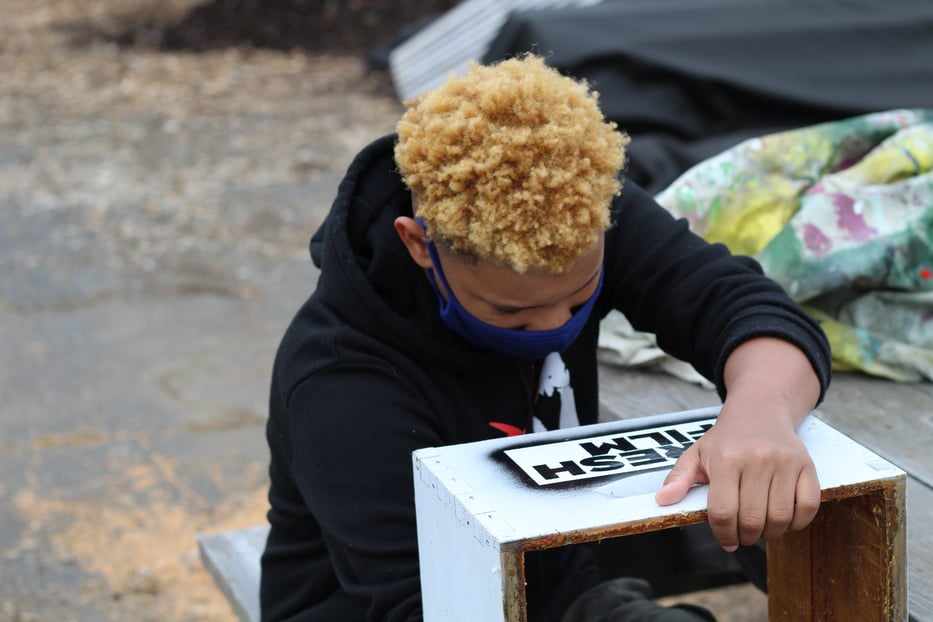
Nazir Grayson, a junior site garden managers, works cleaning out a hive box that will be installed as part of a hive sponsorship
The paintbrush traced the curves of the letter “B”. Gianna Strode inspected her handiwork, and painted over it with white. On another side of the hive box, she painted a set of cartoon beer mugs clinking against one another. The bees in Arthur Street Community Garden were quiet, but an occasional one came by to inspect the paintwork on what could be its future hive.
The hive is part of a hive sponsorship program in which people and companies can sponsor a hive similar to adopting a highway. The sponsorship is just one facet of the Huneebee Project, now buzzing into its second anniversary. Founded in 2018, the venture aims to provide transferable job skills training and employment to youth between the ages of 15 and 23 with past or present child protective or foster care involvement through beekeeping.
Two years later, the program has graduated three cohorts from its Beekeepers in Residence program and installed 11 honey bee colonies in community gardens on James Street in Fair Haven and Arthur street in the Hill. It also launched an online marketplace in 2019.
Sarah Taylor, the founder and executive director, sought to merge her interest in beekeeping with her work as a social worker at the Yale Child Study Center. She saw firsthand how the childcare and foster care systems were under-resourced, leading to gaps in services including job training and mental health for youth. After returning to Connecticut from New York in 2018, she took up beekeeping and saw that the healing aspects could be integrated with her work as a social worker.
At the first meeting in 2018, Taylor remembered seeing many of the youth experience nature and peace in a new way. “I don’t think there was one person who was really in beekeeping or being in the garden,” she said.
At the end, one of the participants, pulled her to the side with excitement and asked to speak in private. He had originally shown up mostly because he didn’t have anything else to do. His opinion had changed.
“I feel so calm and that's great,” he repeated over and over.
The same participants would later go on to become a peer instructor for the next cohort and devoted member of the team.
Beekeeping can be a therapeutic practice, said Taylor. The group is collecting data for long-term studies by tracking the youth’s emotional and mental feelings before and after meetings.
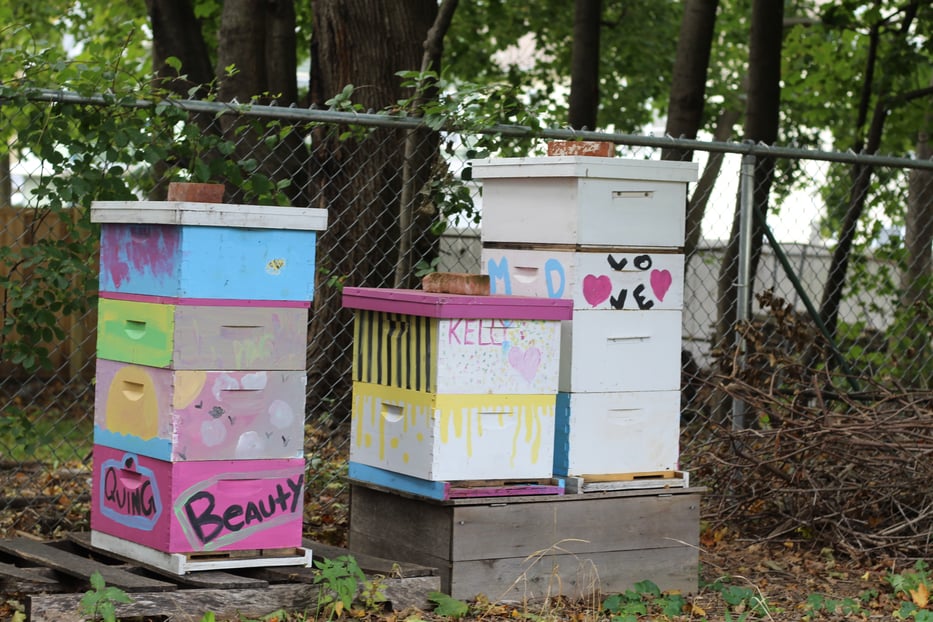 A few of the hives located at the Arthur Street Garden in the Hill.
A few of the hives located at the Arthur Street Garden in the Hill.
“There's something that happens when you are in a bee yard, and you are activating a very natural flight response, but in a controlled environment,” she said. “For someone who has had a history of trauma, who has not had control over that frayed response, to be in a place where we're giving them the tools and support to be in charge … that is healing.”
Dillian Torres, a junior garden site manager and graduate of the most recent cohort, was surprised by the program. At the beginning of the program, the young Fair Havener was afraid of both the bees and his peers. Then he started to lose his fear after working with the team.
“Patience, I noticed that everybody here has it,” he said. “It was funny because everybody scared me. Because everybody here is working as a team if one person freaked out, we all worked through it together. I felt like I could really do this.”
“I never cared about a place like this before,” he added. “I’ve never really been so calm.”
A few months later, Torres stood alongside Nazir Grayson, who now helps oversee the hives at the James Street community garden in Fair Haven. The garden was the newest addition and selected by alumni from the 2019 cohort. The quiet location won out against a different site in the neighborhood that had more noise and traffic.
“They told me what was important to them was to have a space that is calm and peaceful and feels like a refuge,” Taylor said.
For Grayson, the site was an unexpected return to nature. He grew up attending summer camps and being active in nature, but the older he got, the fewer opportunities there were for him to be in green spaces. He quickly fell in love with beekeeping and stayed up late at night researching everything he could about beekeeping.
“I mean, beekeeping in my eyes, keeps everything going in life and to preserve life,” he said.
He and Torres spearheaded the newest product: fermented garlic honey. Both of them have an affinity for graphic design and marketing, so it made sense for them to take the lead, said Taylor.
The online marketplace sells honey harvested from the sites, alongside artisanal items made by various artists who share a similar mission as Huneebee. Proceeds from the market cover the maintenance expenses of the garden and employing the youth.
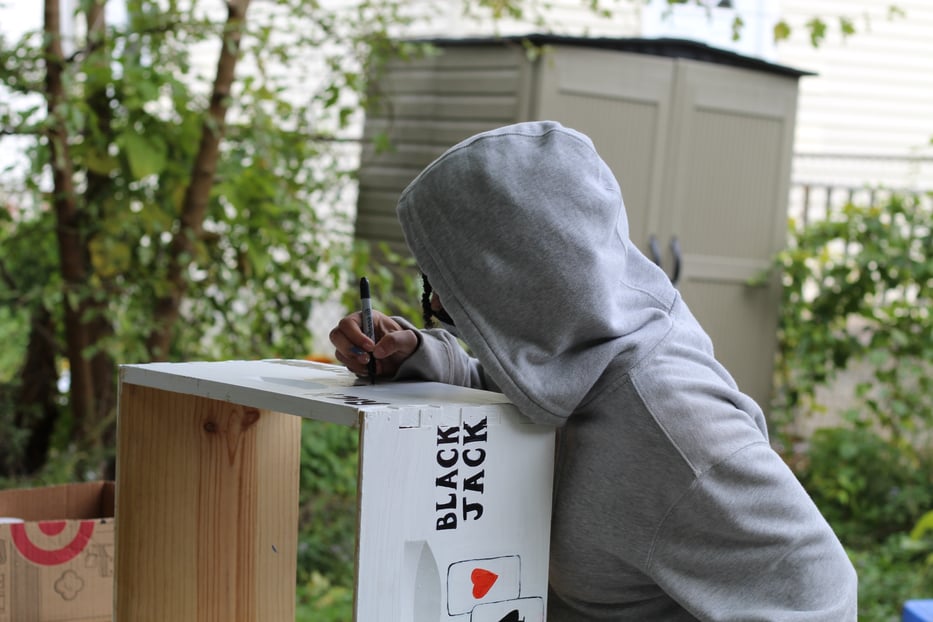 Gianna Strode works on the letters for a hive box commemorating a father and son.
Gianna Strode works on the letters for a hive box commemorating a father and son.
The program makes an effort to hire as many of its graduates as possible to ensure continuity within the organization. This year, former Junior Manager Alex Guzman was promoted to bee apprentice, meaning that she will be able to independently maintain hives at the end of her training.
Beyond hiring its own graduates, the group has events like holiday parties and movie nights for current members and alumni alike. Two years later, alumni will come back and ask for the resumes completed as part of their training.
“We will look at ourselves like a family system,” Taylor said. “Once you become a part of the family, you're always a part of the family.”
This year started out with uncertainty, as the program was forced to start in April, a month later than usual, due to COVID-19. The group had to adapt the rich sensory experience of beekeeping to PowerPoint presentations and Zoom calls for the first month.
“I was worried that we were going to have difficulty reaching the youth because a lot of the support we had in place was gone,” Taylor said. “I was worried that because there was less kind of cohesion and the lack of in person contact that they might not show up.”
It was the opposite. Not a single member of this year’s cohort missed a workshop despite barriers around transportation. In order to complete the program, youth members have to complete 75 percent or more of workshops. They all chose to come as much as possible.
“I think it just speaks to how desperate they were to get out of the home and to have social interaction,” Taylor said. “Because we started these things in person workshops in June and that was the first time for many they had even left the house.”
The group got creative to find alternative means of transportation. After a bike donation, Taylor spent an afternoon with Gianna Strode, manager of hive sponsorships, teaching her how to ride a bike. She was a natural picking it up in less than an hour, Taylor said. For the rest of the summer, she biked to and from work.
For her, there was never doubt that the program would keep going despite facing challenges.
“I just knew it was going to happen,” she said. “It always does.”
A graduate of the 2019 cohort and a senior at West Haven High School, Strode found herself constantly being pushed out of her comfort zone. She found the hard work during the summer months to be worthwhile but helped her realize where her true passions lie: art.
“So I stepped out doing that work because now I feel like I prefer to do painting because it is something I am good at,” she said.
Dedicated to her craft, she pointed to the various hives she’s done over the years and how her skills have improved. The hives are decorated with an assortment of flowers, colorful balloons, and even a Mom themed box.
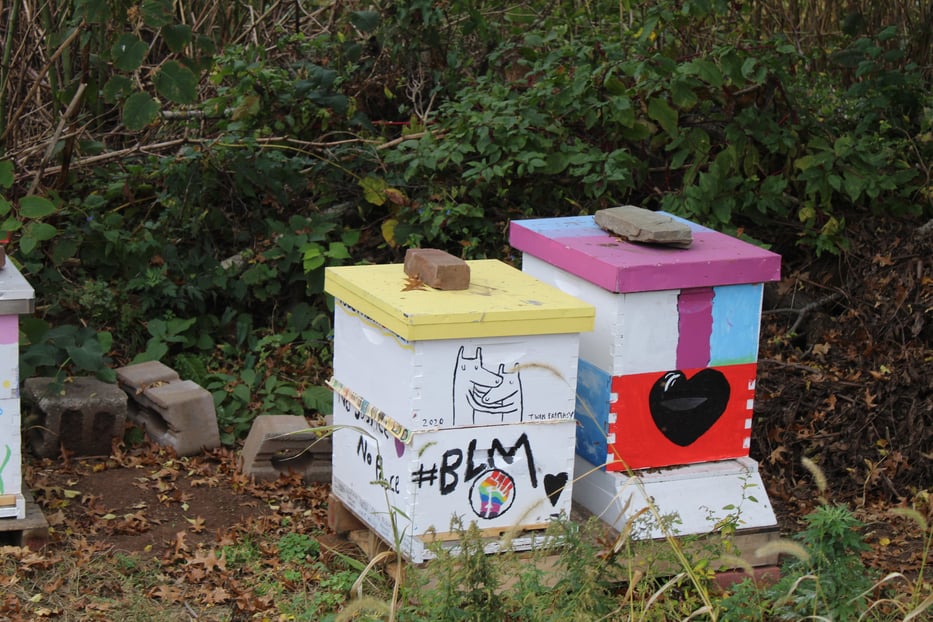 Two the hives at the James Street Community Garden. The queens bees are named Queen Beenie Sanders and Queen AppleBee
Two the hives at the James Street Community Garden. The queens bees are named Queen Beenie Sanders and Queen AppleBee
After high school, she is considering art school and continuing to be involved with beekeeping. She is in the process of installing a beehive in her backyard. The importance of green space and conservation efforts in low-income communities of color, including the Hill and Fair Haven, are important to Strode.
“You expect these places to be in East Rock and not places like this [Newhallville],” she said. “We need these types of things in our neighborhoods too.”
For Collab Co-Director Caroline Smith, Huneebee’s success is rooted in its ability to be an alternative business model that contributes to the economic livelihood of the people in the community. Huneebee was part of Collab’s Fall 2019 Ventures and completed a 12-week mentorship program with them.
“At Collab, we think a lot about corporate models and social justice enterprises. What is the best way for the private sector to be a force in the public good?” she said. “Is Huneebee a nonprofit? A venture? Social enterprise? It’s harder to place, and I think that’s where the genius comes from.”
In her eyes, Huneebee’s success is directly tied to its youth leadership she added. With youth experience and expertise at the front-and-center, they are having an active role in shaping the future of the organization.
In the near future, Taylor hopes to open a brick-and-mortar store to employ even more graduates of the program and install more hives across the city.

